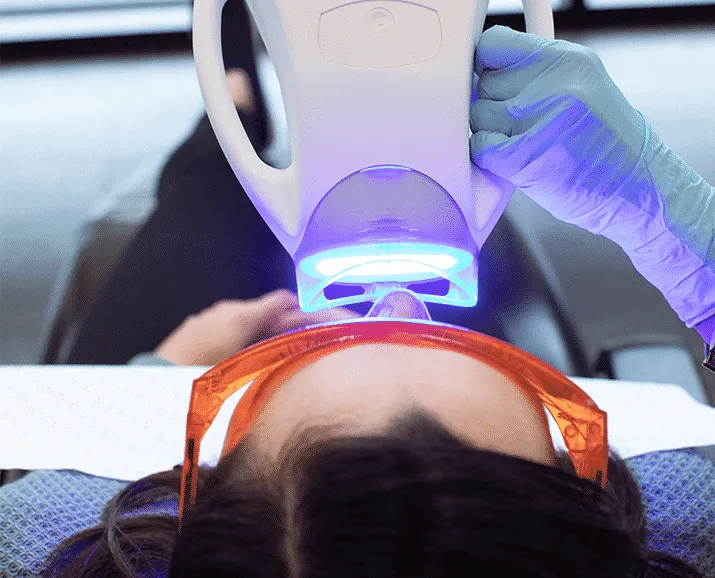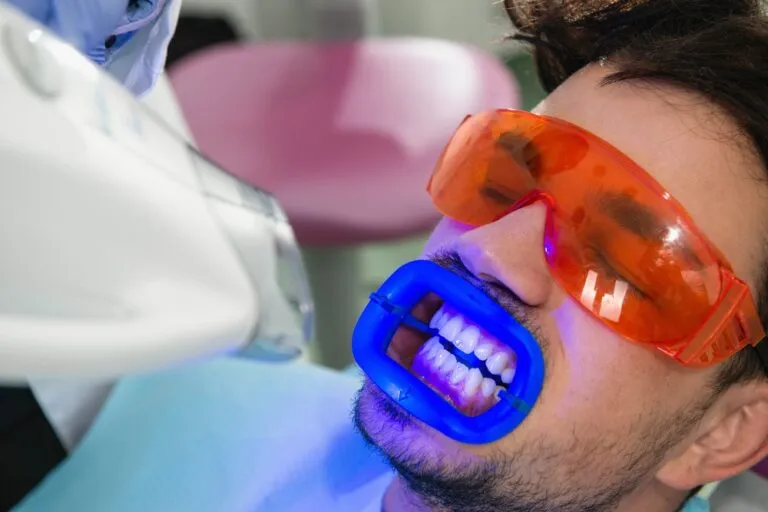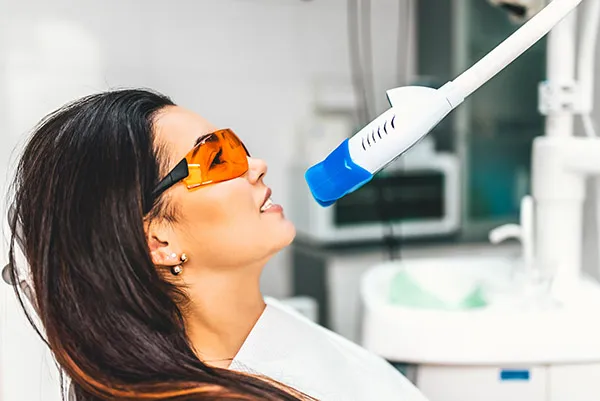What is Laser Teeth Whitening
Laser teeth whitening, also known as power whitening or in-office whitening, is a popular cosmetic dental procedure designed to brighten the shade of your teeth. This method involves the application of a high-concentration bleaching agent, typically hydrogen peroxide, to the teeth. A special laser or light is then used to activate the bleaching agent, accelerating the whitening process. The primary goal of laser teeth whitening is to remove stains and discoloration caused by factors such as aging, genetics, food, drinks (like coffee, tea, and red wine), and smoking. Unlike over-the-counter whitening products, laser whitening is performed by a dental professional, ensuring a controlled and often more effective treatment. It’s a quick procedure, often completed in a single visit, making it an attractive option for those seeking immediate results. The effectiveness of the procedure can vary depending on the individual’s teeth and the type of stains present.
The Laser Whitening Process
The laser teeth whitening process typically begins with a thorough examination and cleaning of your teeth by a dentist or dental hygienist. This ensures that the bleaching agent can effectively reach the tooth surface. The dentist will then isolate your teeth, usually by placing a cheek retractor and protecting your gums with a protective barrier. The bleaching agent is applied to the surface of your teeth, and a special laser or light source is directed at the teeth to activate the whitening ingredients. The process usually takes about an hour, with multiple 15-20 minute intervals where the bleaching agent is applied and activated. After the procedure, the dentist will remove the protective barriers, rinse your mouth, and provide instructions on post-treatment care. Results are often immediate, with teeth appearing several shades whiter. Maintenance, including good oral hygiene and avoiding staining foods and drinks, is crucial to prolong the whitening effects.
Common Side Effects of Laser Teeth Whitening

While laser teeth whitening is generally safe and effective, it’s important to be aware of potential side effects. These side effects are usually temporary and resolve within a few days to a couple of weeks. The intensity of the side effects can vary depending on the individual’s sensitivity, the concentration of the bleaching agent, and the duration of the treatment. Being informed about these potential issues allows you to make a more informed decision about whether or not laser teeth whitening is right for you and to prepare for any potential discomfort.
Tooth Sensitivity
Tooth sensitivity is one of the most common side effects of laser teeth whitening. It occurs when the bleaching agent penetrates the enamel and reaches the dentin, which contains nerve endings. This can lead to temporary sensitivity to hot, cold, sweet, or acidic foods and drinks. The sensitivity typically peaks within a few days after the procedure and gradually subsides. Dentists often recommend using toothpaste designed for sensitive teeth before and after the treatment to minimize this effect. Avoiding extremely hot or cold foods and drinks during this time can also help reduce discomfort. In some cases, a fluoride treatment may be applied to help strengthen the enamel and reduce sensitivity.
Gum Irritation
Gum irritation, another common side effect, can manifest as inflammation, redness, or soreness of the gums. This can occur if the bleaching agent comes into contact with the gum tissue, which is more sensitive than the tooth enamel. Dentists take precautions, such as using protective barriers, to minimize this risk. However, some irritation is still possible. The irritation is usually mild and resolves within a few days. Rinsing with a saltwater solution can help soothe the gums and speed up the healing process. Avoiding harsh brushing or flossing near the affected area and using a soft-bristled toothbrush can also help prevent further irritation. If the irritation is severe or persists, contacting your dentist for advice is advisable.
Enamel Damage

Although rare, enamel damage is a potential, albeit less common, side effect. Overuse or misuse of the bleaching agent, such as using it too frequently or at a high concentration, can weaken the enamel and increase the risk of erosion. This is why it’s crucial to have the procedure performed by a trained dental professional. Proper application and monitoring during the process minimize the risk of enamel damage. Following the dentist’s post-treatment instructions, including maintaining good oral hygiene and avoiding acidic foods and drinks, can help preserve enamel health. Regular dental check-ups allow your dentist to assess the condition of your teeth and take any necessary measures to protect your enamel.
How to Prevent These Side Effects
While some side effects are unavoidable, certain precautions can be taken to minimize their occurrence and severity. Choosing a qualified and experienced dentist is the first step. A skilled dentist will properly assess your teeth, determine the appropriate treatment plan, and take necessary measures to protect your gums and enamel during the procedure. Following pre-treatment and post-treatment instructions diligently is also essential. Using toothpaste designed for sensitive teeth before and after the procedure can help reduce sensitivity. Avoiding staining foods and drinks, such as coffee, tea, red wine, and berries, in the days following the treatment will help preserve the whitening effects and reduce the likelihood of side effects. Good oral hygiene practices, including regular brushing and flossing, are crucial for maintaining healthy teeth and gums.
Consultation with a Dentist
Before undergoing laser teeth whitening, a thorough consultation with a dentist is essential. The dentist will examine your teeth and gums to determine if you are a suitable candidate for the procedure. They will assess factors such as the presence of any existing dental work, the severity of staining, and any history of tooth sensitivity. This consultation allows the dentist to develop a personalized treatment plan tailored to your specific needs and to inform you about the potential risks and benefits of the procedure. The dentist may also recommend professional cleaning to remove plaque and tartar, which can improve the effectiveness of the whitening treatment. Open communication with your dentist about your expectations and concerns is vital for ensuring a successful and comfortable experience.
Pre-Treatment Care

Preparing for laser teeth whitening can help minimize potential side effects. Your dentist may recommend using toothpaste for sensitive teeth for a week or two before the procedure to reduce the risk of sensitivity. Avoiding staining foods and drinks in the days leading up to the treatment can also improve the results. This includes coffee, tea, red wine, and dark-colored juices. Inform your dentist about any existing dental conditions, such as cavities or gum disease, as these may need to be addressed before proceeding with the whitening treatment. Follow any specific instructions provided by your dentist to ensure the best possible outcome and to minimize any discomfort during the procedure. Consider getting a professional cleaning before the whitening session to remove surface stains and plaque.
Post-Treatment Care
Following post-treatment instructions is crucial for a successful outcome and to minimize side effects. Continue using toothpaste designed for sensitive teeth for a couple of weeks after the procedure. Avoid staining foods and drinks, such as coffee, tea, red wine, and berries, for at least 24-48 hours, or longer if recommended by your dentist. Maintain good oral hygiene by brushing gently with a soft-bristled toothbrush and flossing regularly. Drink plenty of water to stay hydrated and help neutralize any potential acidity in the mouth. If you experience any significant discomfort or unusual symptoms, contact your dentist immediately. Schedule a follow-up appointment with your dentist to evaluate the results of the whitening treatment and discuss any concerns you may have.
Other Potential Side Effects
While tooth sensitivity and gum irritation are the most common side effects, other less frequent reactions may occur. Being aware of these potential issues can help you be prepared and know when to seek professional help. It’s important to remember that these side effects are usually temporary and resolve on their own. If you experience any unusual symptoms, it’s always best to consult with your dentist to rule out any underlying issues and receive appropriate care.
Allergic Reactions

Allergic reactions to the bleaching agent or other materials used in the laser teeth whitening process are rare but possible. Symptoms of an allergic reaction can include swelling, itching, rash, or difficulty breathing. If you experience any of these symptoms, seek immediate medical attention. Inform your dentist about any known allergies before the procedure. In some cases, a patch test may be performed to check for any allergic reactions. It is important to communicate any sensitivities or allergies to your dentist to ensure your safety and well-being throughout the treatment.
Incomplete or Uneven Whitening
In some cases, laser teeth whitening may not produce the desired results, leading to incomplete or uneven whitening. This can be due to various factors, such as the type of stains present, the initial shade of your teeth, or the individual’s response to the bleaching agent. Certain types of stains, such as those caused by tetracycline antibiotics, may be more resistant to whitening. The dentist may recommend additional treatments or alternative whitening methods to achieve the desired results. Incomplete whitening may also be caused by the presence of fillings, crowns, or other dental work, as these materials do not whiten in the same way as natural teeth. If you are not satisfied with the initial results, discuss your concerns with your dentist to explore further options.
Conclusion
Laser teeth whitening is an effective way to brighten your smile, but it is important to be aware of potential side effects. While most side effects are temporary and manageable, understanding them can help you make an informed decision and prepare for the procedure. Consulting with a qualified dentist, following pre- and post-treatment instructions, and practicing good oral hygiene are essential for minimizing risks and achieving optimal results. If you are considering laser teeth whitening, discuss your concerns with your dentist and weigh the potential benefits against the potential side effects to determine if it is the right choice for you. A beautiful, bright smile can boost your confidence, so prioritizing your oral health is always a worthwhile endeavor.
